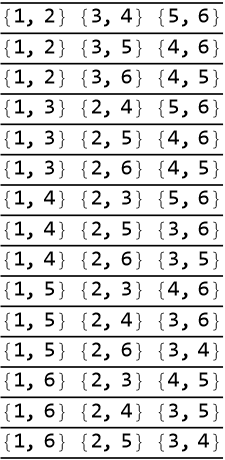I'd like to find all the partitions (each subset of a partition should contain 2 elements) of a set composed by an even number of elements. For example, given $A=\lbrace 1,2,3,4,5,6 \rbrace$, I'd like to see the partitions:
$$ \lbrace \lbrace 1,2 \rbrace, \lbrace 3,4 \rbrace, \lbrace 5,6 \rbrace \rbrace \\ \lbrace \lbrace 1,3 \rbrace, \lbrace 2,4 \rbrace, \lbrace 5,6 \rbrace \rbrace \\ \ldots $$
etc.




Partition[#,2]&/@Permutations@Range@6? $\endgroup$